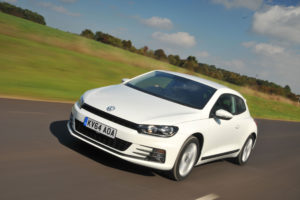 Volkswagen AG secured 20 billion euros ($25 billion) in battery supplies to underpin an aggressive push into electric cars in the coming years, putting pressure on Tesla Inc. as it struggles with production issues for the mainstream Model 3.
Volkswagen AG secured 20 billion euros ($25 billion) in battery supplies to underpin an aggressive push into electric cars in the coming years, putting pressure on Tesla Inc. as it struggles with production issues for the mainstream Model 3.
As of next year, the 12-brand group will roll out a new battery-powered model “virtually every month,” Chief Executive Officer Matthias Mueller said at the company’s annual press conference. “This is how we intend to offer the largest fleet of electric vehicles in the world.”
Volkswagen shares were trading up 0.4 percent to 159.14 euros as of 12:50 p.m. in Frankfurt, narrowing the stock’s drop this year to 4.4 percent.
Diesel Quandry
Pressure has intensified on Volkswagen to overhaul its lineup. Its diesel-cheating scandal, which erupted in September 2015, sparked a backlash over the technology, including potential urban driving bans. Diesel is key to efforts to meet tighter environmental targets because of its fuel efficiency, even though it emits smog-causing nitrogen oxides. Volkswagen reaffirmed its backing for the technology with Mueller calling it “part of the solution,” even as Toyota Motor Corp. pulls diesel cars from its lineup in Europe, the main market for the vehicles.
As part of Volkswagen’s 20 billion-euro push into electric cars, it’s setting up a standalone sub-brand for battery-powered vehicles. The first model with the I.D. nameplate will be the Neo hatchback that goes on sale in 2020. The Audi luxury marque is set to begin deliveries later this year of the all-electric E-Tron SUV.
Even with the battery-supply deals, one of the largest purchasing tenders in the auto industry, Volkswagen’s power-supply issues are still far from over. The company, which has struggled to secure sources of cobalt, a critical component for modern batteries, said that it’s working on ways to reduce the amount of the element needed for its electric cars. Producing the powerpacks itself is not in the cards.
“This is not one of our core competencies,” said Mueller, who has faced pressure from employee representatives to invest in battery-cell production. “Others can do it better than we can.”
Chinese manufacturer CATL, which Mueller confirmed today as one of Volkswagen’s future battery providers, is considering a site in Europe for its first overseas plant, Chairman Zeng Yuqun said a week ago.
Development Spending
Even with its push to ramp up electric-car production and avoid penalties from tighter environmental regulations, Volkswagen plans to rein in expenditures. Development spending declined 3.9 percent to 13.1 billion euros in 2017, equivalent to 6.7 percent of sales. The company reiterated a target to lower that ratio to 6 percent by 2020.
Managing the technology shift requires an intense focus on maintaining profitability from Volkswagen’s current lineup. The manufacturer predicts an operating margin this year of between 6.5 percent and 7.5 percent of revenue, compared with 7.4 percent in 2017.
“Naturally, we are looking to continue our operating business success in 2018,” said Mueller. “Not least because we must generate the revenue we will need for our enormous future investments.”
